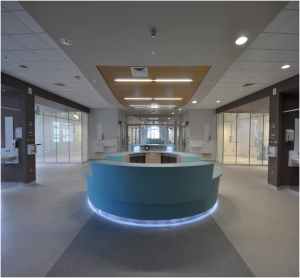DoH Health Estates, on behalf of the South Eastern Health & Social Care Trust, led the delivery of an extension to the Ulster Hospital.
Project Background
The Ulster Hospital serves a 
The new build project led by Health Estates cost £39 million and provided floor space of 16,162m2 for the hospital.
Design Features
The Critical Care Complex is one of the most technologically advanced health care buildings in the UK - providing state of the art clinical and support facilities, which will allow for future flexibility as the services provided at the hospital change and develop going forward.
The interior of the building is designed to maximise natural light with spacious, comfortable and aesthetically pleasing surroundings.

Particular attention has been given to creating an environment which is conducive to improving patient health, comfort and recovery. This is particularly evident in the choice of colours providing a therapeutic, healing and stimulating environment where appropriate.
Privacy, dignity and respect for patients and their families was a key factor influencing the design, as was the desire to provide an environment that supported and enriched the daily working routine of the staff.
Throughout the design process, it was very much appreciated that both patients and relatives may be anxious and apprehensive when intensive care is required.
To help alleviate this anxiety, the design concept has focused on providing as far as is possible an environment which is ‘non clinical’ and offers areas for respite and relaxation, including overnight accommodation for relatives of very ill patients.
